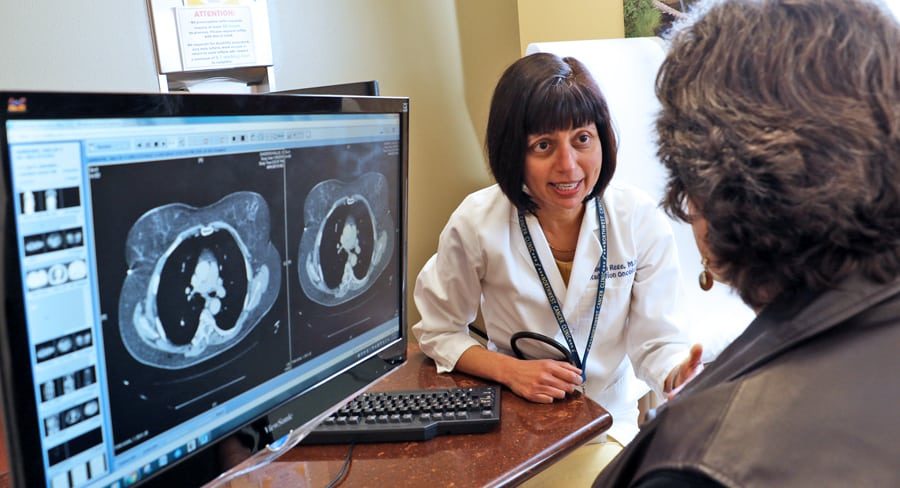
Home » Northwest Cancer Clinic adds new weapon in fight against brain cancer
Northwest Cancer Clinic adds new weapon in fight against brain cancer

March 15, 2016
The Northwest Cancer Clinic in Kennewick is giving patients with glioblastoma brain cancers a new tool to battle invasive cancer cells — a device called Optune.
Northwest Cancer Clinic in Kennewick is affiliated with 21st Century Oncology, a national provider of integrated cancer care services. It was one of the first medical practices nationally to provide Optune.
“If you have a new weapon to fight the brain tumor – even if you’re prolonging survival – it’s a huge benefit because, like I tell my patients, then there may be something else that can help later,” said Dr. Sheila Rege, M.D., who has been an oncologist in the Tri-Cities for 18 years. “It’s been several years since we’ve seen something that can control glioblastoma. That’s why there’s so much excitement.”
The U.S. Food and Drug Administration approved the use of the Optune device in October.
The makers of Optune, the Jersey Isle-based Novocure, did an extensive study treating 457 gliobastoma patients in the U.S. with the Optune device from October 2011 through November 2013.
Optune is a portable, non-invasive medical device that creates low-intensity, alternating electric fields within a tumor that exert physical forces on electrically-charged cellular components, killing cancer cells.
Rege said the Northwest Cancer Clinic strives to provide the most up-to-date technology and care, to its patients, and obtaining devices like Optune helps the center accomplish that mission.
About 6 percent of the local clinic’s patients have had glioblastoma, the fastest growing and most aggressive of brain tumors.
“Anything we can do to slow that down is great news,” Rege said. “It’s not a substitute for surgery. It’s an option to use along with other standard therapies.”
Generally, brain cancer is treated with surgery to remove the malignant tumors, radiation to kill the cancer and/or chemotherapy, when intravenous drugs are used to kills cancer cells.
Optune is used by patients at home. They apply it to the scalp over the tumor area and it creates alternating electric fields that travel across the upper part of the brain in different directions to help slow or stop recurrent cancer cells from dividing. The beauty is that side effects are few compared to systemic therapy, which affects cells throughout the body, Rege said.
“Because of the side effects being less with Optune, I think it’ll be adopted widely and offered to patients as an option,” Rege said.
The study’s safety analysis showed that 24.3 percent of patients had skin reactions and 11.3 percent experienced heat sensations — the two most common side effects.
Dr. Rege said that like most doctors, she is cautiously optimistic about the study’s findings.
“I’m always excited when something new comes out, but want to make sure it’s best for patients,” Rege said. “Most of us won’t be recommending it for initial treatment unless the patient requests it. You want multiple trials conducted first. We have a patient who will probably qualify for it, but we try to do the other treatments for initial stage first. Brain tumors scare everybody; having one more thing in the arsenal that doesn’t cause a lot of side effects is so helpful.”
Though Optune isn’t a cure, it can increase survival by several months, she said.
Optune previously only had FDA approval as a treatment in patients with recurring brain cancer, but a study was launched after two patients with glioblastoma lived for more than five years while simultaneously utilizing Optune and undergoing chemotherapy.
“That pilot trial was what really got the real study going,” Rege said.
Now, Northwest Cancer Clinic doctors are able to write an Optune prescription, which is considered “durable medical equipment” for patients to use at home. It is portable and designed to be used for at least 18 hours a day for the best response, specifically in patients age 22 and older.
During its first year, Northwest Cancer Clinic exceeded its budget projections by 50-100 percent, Rege said.
“We were able to retain patients in the Tri-Cities who would otherwise have gone to Seattle,” she added.
Clinic staff regularly participates in video conferences with oncologists and doctors at hospitals in Seattle and OHSU. The local clinic was the first in the area to gain national accreditation, to bring research in and to offer the top-of-the-line TrueBeam systems to treat a moving target with unprecedented speed and accuracy.
“Cancer is a serious business. From the beginning, there has been a need in this community to provide a service in a compassionate, caring environment to those patients in need. As many people continue to be inflicted with the disease and seek out care, our business continues to grow based on the quality care and service that we are known to provide,” Rege said.
Being affiliated with a large company is an advantage for area residents, Rege said.
“(21st Century Oncology) jumped on board and assisted with the study before it was approved by the FDA. We’re a small town but affiliating with a national company really brings the resources to a small town,” Rege said.
The Northwest Cancer Clinic is at 7379 W. Deschutes Ave., Ste. 100 in Kennewick. The phone number is 509-987-1800 and the website is nwcancerclinic.21co.com.
Business Profiles Local News
KEYWORDS march 2016





